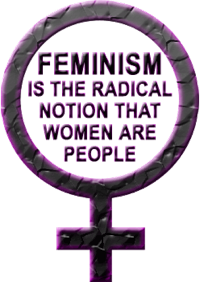 Among the many questions I am asked, one of those that has been the most difficult to answer has been whether I consider myself a feminist. It is difficult because there are many different definitions of feminism out there, and the person asking the question is rarely willing to specify what he or she means by feminism. I have to pause to ask about the questioner's understanding of feminism so I know how to answer, which tends to be perceived as oppositional or evasive.
Among the many questions I am asked, one of those that has been the most difficult to answer has been whether I consider myself a feminist. It is difficult because there are many different definitions of feminism out there, and the person asking the question is rarely willing to specify what he or she means by feminism. I have to pause to ask about the questioner's understanding of feminism so I know how to answer, which tends to be perceived as oppositional or evasive. According to the narrowest definition I have heard, and one that seems quite popular in the atheist community these days, a feminist is one who supports the equality of women (i.e., equal rights). I've even come across some people who insist that the meaning of feminism is limited to the issue of equal pay for equal work. Using these narrow definitions, I am definitely a feminist. Politically, socially, and economically, I do indeed support equal rights for women. The thing is, these narrow definitions do not adequately capture how I think of feminism.
My Understanding of Feminism
I've always seen feminism as being about far more than support for gender equality. My view of feminism is primarily rooted in what has been referred to as second wave feminist theories, as well as multiculturalism. I am familiar with some aspects of third wave feminism but less so.
I have great difficulty separating the definition of feminism from the feminist theories I have studied and the feminist scholars I have read. Without going into detail, I'll simply say that the feminism with which I am most familiar seeks to do more than describe the fact of inequality; it seeks to explain it. An example would be the social construction of gender. For me, a central part of feminism has always involved some acceptance of these theoretical explanations, especially social constructionist thought.
Another way to say this might be that I've been influenced as much by the academic side of feminism as the activist side. I don't mean that academic feminists are not also activists; I just mean that my understanding of feminism has been shaped by my academic study of feminist theories. Perhaps this is one of the reasons I do not recognize much of what is being called feminism in today's atheist movement as being consistent with feminism.
My understanding of feminism has also been influenced by my teachers. The women from whom I learned about feminism, both in the classroom and outside, during my graduate training had much in common. They were all highly educated with doctoral degrees or on their way to obtaining them. They were well-spoken, thoughtful, and respected among their colleagues. They were not all White. And they generally agreed that men should probably not refer to themselves as feminists.
They described men with positive attitudes toward feminism as pro-feminists, and this was the term I would come to adopt to describe myself. I've always seen it as a way of communicating that I support the feminist movement without trying to claim that I am a member of it.
It is also worth noting that they shared the perspective that men were harmed by sexism and restrictive gender roles as well. While their focus was on women, they encouraged what is sometimes referred to as "men's liberation" (i.e., opposition to the manner in which a patriarchal society oppresses men) as an important part of feminism. I happen to agree with this perspective, even though a few poorly informed atheist women have suggested that I must be an "MRA" for holding such views.
Am I a Feminist?
When asked today if I am a feminist, I usually explain that I am pro-feminist but that I do not call myself a feminist because I'm not sure it makes sense for men to do so. I recognize that this is just one perspective and not necessarily the correct one. It is not my place to tell other men that they should not call themselves feminists; it is merely my choice in how I label myself. And then, I'm usually criticized for my choice of label.